Most Nigerians seem to have abandoned the notion of working from home since the COVID-19 lockdown was lifted. According to the Google Mobility Report, movements in workplaces have increased post-lockdown compared to pre-lockdown.
The report showed that mobility trends for places of work on 14th of June (Post-lockdown) were 9% higher than the mobility trend report of the corresponding day of the week, during the five-week period between 3 January and 6 February 2020 (Pre-lockdown).
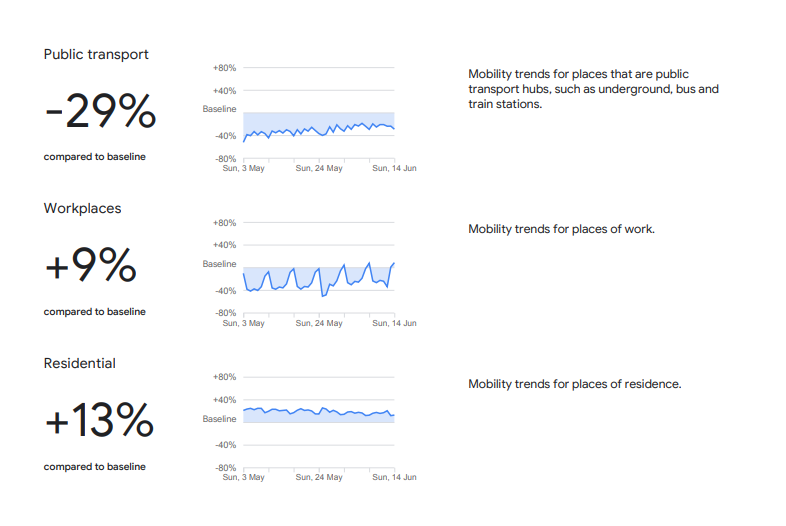

Changing Lifestyle
The lifestyle of Nigerians, like other people across the world, has been significantly affected by the coronavirus pandemic. Since the virus broke out in China a few months ago, people have been forced to adapt and change the way they live to survive the effects of the pandemic.
Globally there are over 8.8 million coronavirus cases, 463,441 deaths and 4,655,858 recovered cases.
In the case of Nigeria, the total lockdown measure which was effected by the federal government on March 29th and lifted more than a month later significantly affected how people lived.


From remote working to the boom in social e-commerce and online entertainment, most people adopted a lifestyle powered by technology during the lockdown. Reviewing Google mobility report, here are some of the major ways the lifestyle of Nigerians have changed and how it possibly relates to the increasing number of infection in the country.
How Nigerian’s are Working
Following the commencement of the lockdown in March, most businesses and companies were forced to embrace the new reality of working remotely. However, It appears that many Nigerian businesses couldn’t find productivity with the model as more people are going back to their workplaces after the lockdown.
In Lagos, mobility in office spaces increased by 4% compared to the time before the COVID-19 lockdown. Similarly, Abuja and Oyo had 11% increase in workplace mobility while Kano had a 7% increase.
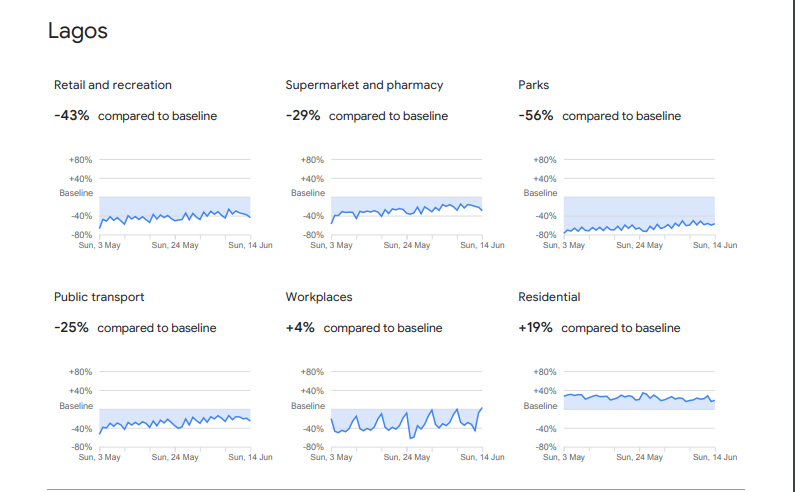

Also, evaluating the spread of the virus with the corresponding change in mobility data in different states showed that a 4% increase in workplace mobility in the days between 7th and 14th June coincided with a 1,336 increase in the number of infections. This result shows that the increase in the number of people going to work could have helped propagate the virus.
Lagos has the highest number of COVID-19 infections in the country with 8,576 as at the time of this report.
The second most infected city, Abuja had a 2% increase in workplace mobility during the same period which coincided with 295 increase in infection. Kano, the third most infected city on the other hand lost 7% of its workplace mobility but it still had an infection increase of about 138.
Shopping
Although the lockdown has been lifted, the traffic in markets and pharmacies hasn’t returned back to pre-lockdown levels. For example, in Lagos, the nations commercial capital, there is a 29% reduction in mobility for markets and pharmacies when compared to pre-lockdown data.
Similarly, Abuja and Oyo have a 24% and 20% reduction in market and pharmacy mobility trends respectively. Kano which was not affected by the initial lockdown also had a reduction in market mobility data but it was after the lockdown. Its market mobility dropped 9% between 7th and 14th of June.
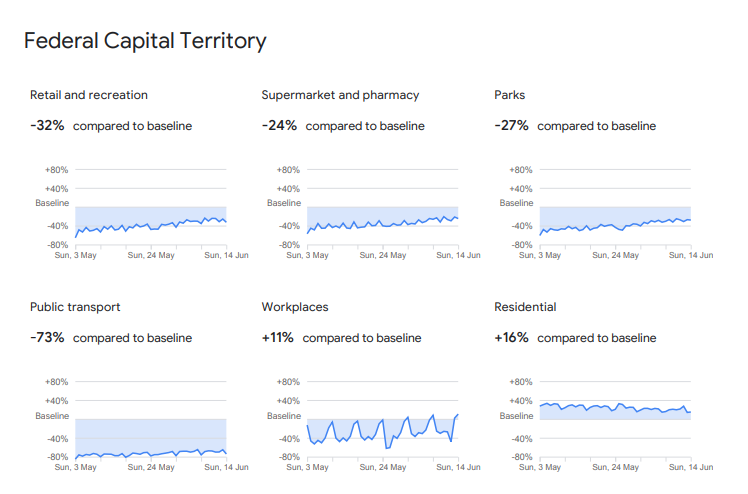

The general reduction in market mobility could have been caused by still existing restriction as with the Tuesdays and Thursdays market days employed in Lagos. It could also be as a result of more people trying to stay safe by limiting the amount of time spent in the market or ordering for the groceries they need from supermarkets and pharmacies.
Outdoor and Recreational Activities
During the lockdown, people turned to social media, games and video streaming platforms for entertainment as an alternative to outdoor activities like cinemas.
However, even with the lockdown lifted, the mobility report shows that people still haven’t returned back to the pre-lockdown social lifestyle. In Lagos, mobility trends in restaurants, cafes and cinemas have reduced by 43% while that of beaches and parks have reduced by a whopping 56%.
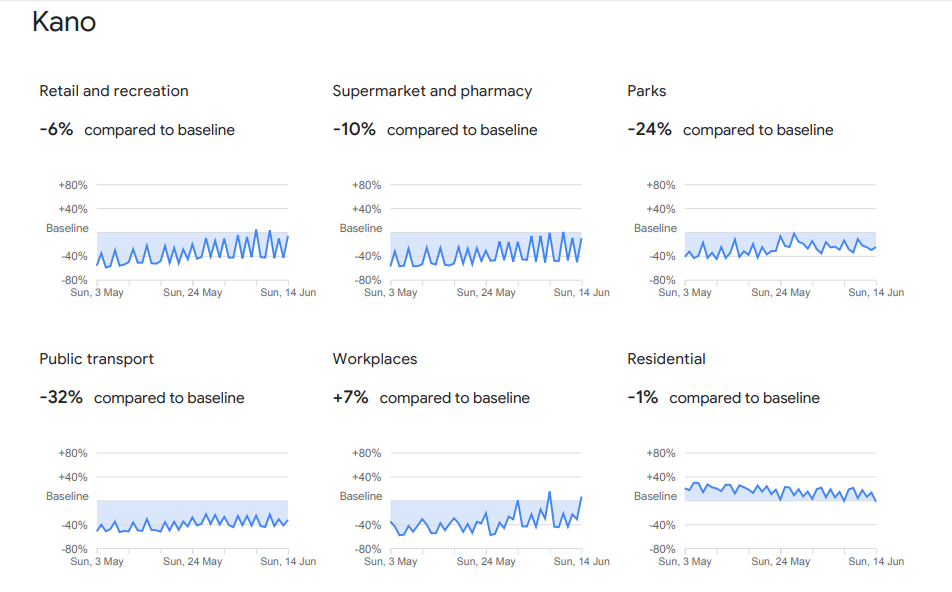

Similarly in Abuja and Oyo, mobility trends in restaurants, cafes and cinemas have reduced by 32% and 25% respectively while that of beaches and parks have reduced by 27% and 24%.
This results would be in part because cinemas, beaches and public places are still closed and restaurants mostly only allow for pickups. There is also a possibility that a significant amount of people are still staying indoors and avoiding crowded places like parks due to the increasing rate of infection.
Public Transportation
Immediately after the lockdown, the roads in major cities like Lagos were quickly flooded with cars and the familiar traffic gridlocks returned. However, Google’s mobility report has shown that there has been a significant reduction in public transportation compared to pre-lockdown numbers.
In Lagos, mobility trends of public transports have reduced by 25%. For Abuja, the report recorded a whopping 73% reduction while Kano and Oyo registered 32% and 26% reductions respectively.
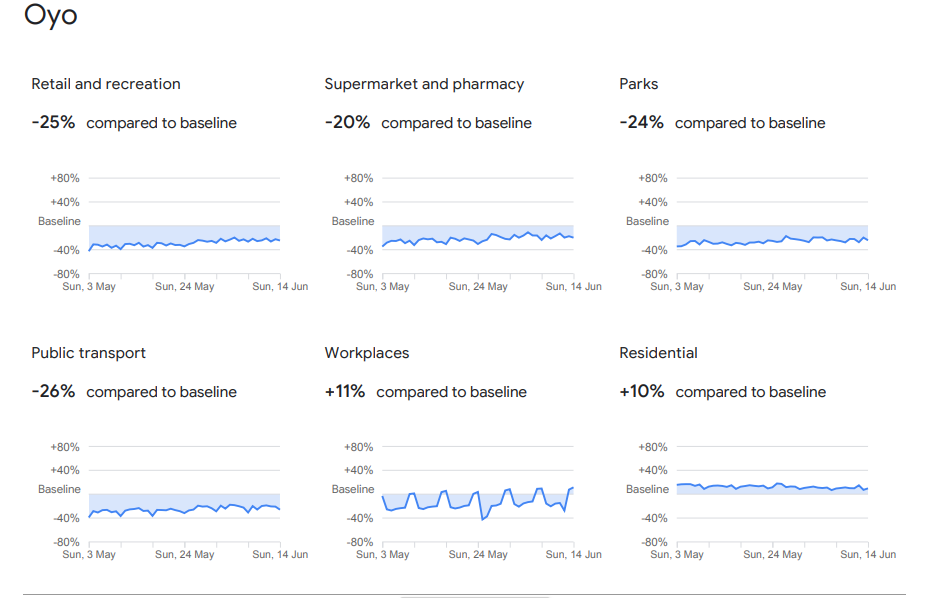

Although, transportation is an important standpoint in the spread of the virus, an evaluation of the report shows that the percentage reduction in transportation mobility remained unchanged during the one week period when Lagos added 1,336 new COVID-19 infections.
However, Abuja and Oyo showed a 2% and 5% respective increase in public transport mobility during the same period but had infections of less than 200.
In conclusion
The fact that the coronavirus pandemic has changed the way Nigerians live is obvious. However, the mobility report better gives us a measure of just how much has changed and what the new norm looks like.
Nigeria is currently the third most infected country in Africa with a total infection of over 20,000 and still rising. How the increasing numbers will further affect things is unknown but the report points towards the fact that Nigerians are gradually going back to their old way of life.






